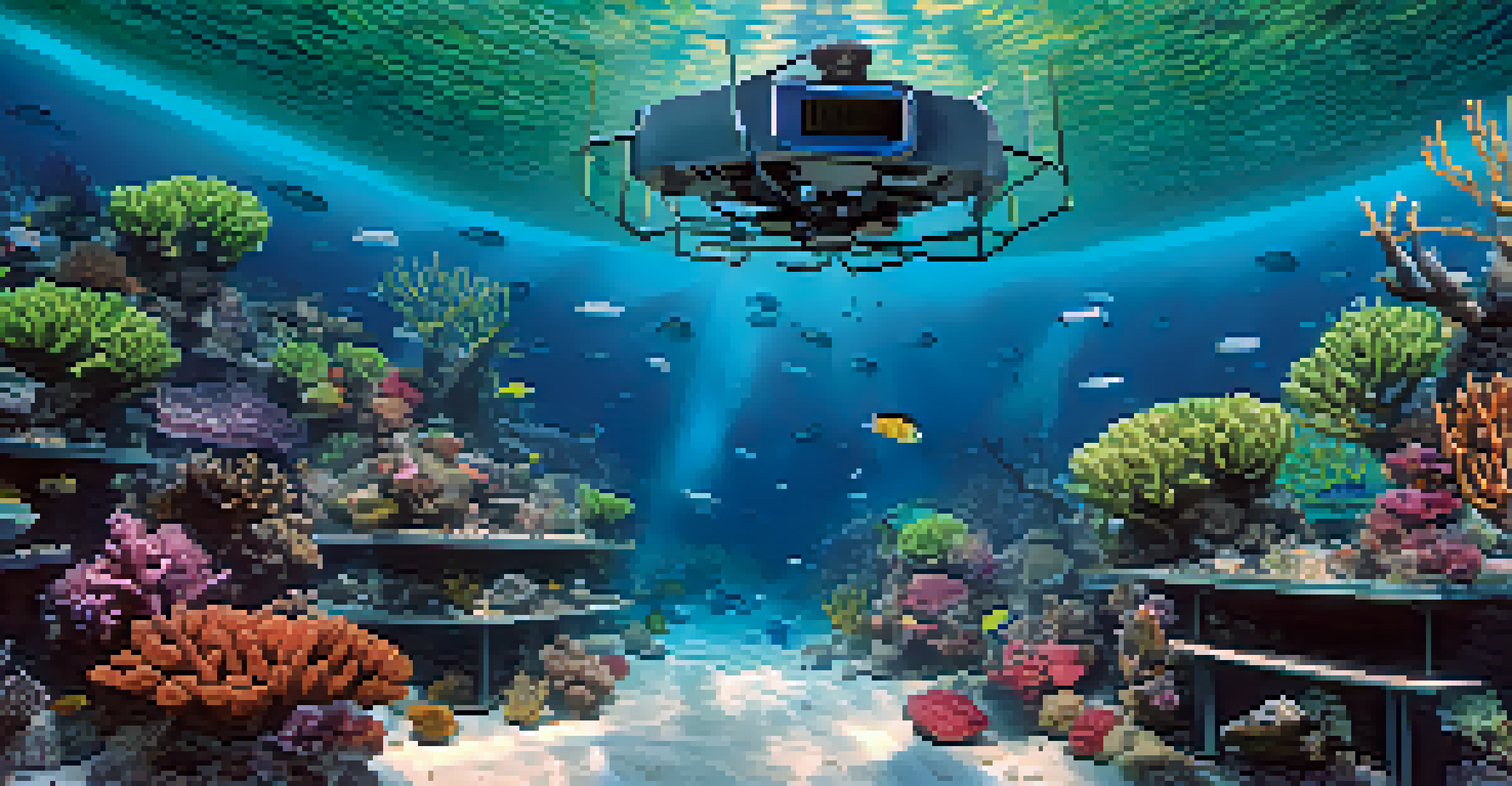Florida's Coral Reefs: Preserving Marine Life and Ecosystems

The Importance of Florida's Coral Reefs for Marine Life
Florida's coral reefs are not just stunning underwater landscapes; they are vital ecosystems that support a rich diversity of marine life. These reefs provide habitat for countless species, from colorful fish to majestic sea turtles. Without these thriving environments, many marine species would struggle to survive.
Coral reefs are the most diverse ecosystems on the planet, and they are essential for the survival of countless marine species.
In addition to supporting marine biodiversity, Florida's coral reefs play a crucial role in maintaining the health of our oceans. They act as natural barriers, protecting coastlines from erosion and reducing the impact of storm surges. This protective function is especially important for coastal communities that rely on the ocean for their livelihoods.
Moreover, the reefs contribute to the economy through tourism and fishing. Millions of visitors flock to Florida each year to snorkel and dive among the vibrant corals, generating significant revenue for local businesses. Preserving these reefs not only protects marine life but also supports jobs and local economies.
Threats Facing Florida's Coral Reefs Today
Despite their importance, Florida's coral reefs are under severe threat from various human activities and environmental changes. Climate change, with its associated rise in sea temperatures, leads to coral bleaching, a phenomenon where corals lose their vibrant colors and vital nutrients. This stress can ultimately result in coral death, diminishing the overall health of the reef.

Pollution is another major threat to these ecosystems. Runoff from agriculture, urban areas, and wastewater can introduce harmful chemicals and excess nutrients into the ocean, causing algal blooms that suffocate corals. These blooms block sunlight and deplete oxygen levels, making it difficult for corals to thrive.
Coral Reefs Support Marine Life
Florida's coral reefs are essential habitats that sustain a rich diversity of marine species and contribute to ocean health.
Additionally, overfishing and destructive fishing practices can disrupt the delicate balance of reef ecosystems. When key species are removed, it can lead to a cascade of negative effects, impacting not only the coral but also the myriad of life that depends on it. Addressing these threats is crucial for the future of Florida's coral reefs.
The Role of Conservation Efforts in Reef Protection
Conservation efforts play a pivotal role in safeguarding Florida's coral reefs. Various organizations and governmental bodies are working diligently to restore damaged reefs and implement protective measures. These initiatives often include coral nurseries, where baby corals are grown and later transplanted onto degraded reefs to help them recover.
The best way to protect our oceans is to engage our communities and empower them to be stewards of their marine environment.
Public awareness campaigns are also crucial in promoting responsible activities that benefit the reefs. By educating locals and tourists about the impact of their actions, such as avoiding coral touching while snorkeling, we can foster a culture of respect and care for these fragile ecosystems. Knowledge is a powerful tool in conservation.
Moreover, stricter regulations on fishing and pollution can help mitigate human impacts on coral reefs. By enforcing sustainable fishing practices and reducing runoff, we can create a healthier marine environment that allows coral reefs to flourish. Community involvement is essential to ensure these efforts are effective and enduring.
Engaging Local Communities in Reef Conservation
Local communities are vital partners in the conservation of Florida's coral reefs. Engaging residents in conservation efforts fosters a sense of ownership and responsibility toward their marine environment. When communities understand the value of reefs, they are more likely to support and participate in conservation initiatives.
Programs that involve community-led clean-up events or reef monitoring can empower locals to take an active role in protecting their natural resources. These hands-on experiences not only help maintain the health of the reefs but also deepen the connection between people and the ocean. It's a win-win situation for both the environment and the community.
Threats to Coral Reefs Abound
Human activities like climate change, pollution, and overfishing pose significant threats to the survival of Florida's coral reefs.
Additionally, involving local fishermen in sustainable practices can lead to a more balanced ecosystem. By adopting methods that protect coral habitats, fishermen can help ensure the long-term viability of their livelihoods while also contributing to the health of the reefs.
Innovative Technologies for Coral Restoration
Technology is playing an increasingly important role in coral restoration efforts. Innovations such as underwater drones and remote sensing are being used to monitor reef health and assess damage. These tools provide valuable data that can inform conservation strategies and help prioritize areas for restoration.
One exciting development is the use of 3D printing to create artificial reefs. These structures can provide a substrate for coral growth, offering a new hope for damaged areas. By mimicking natural reef structures, these artificial reefs can encourage marine life to return and thrive in previously degraded habitats.
Furthermore, genetic research is being conducted to breed more resilient coral species that can better withstand climate-related stressors. By understanding the genetics of corals, scientists hope to develop strains that are more resistant to bleaching and disease, helping to secure the future of these vital ecosystems.
Education and Advocacy: Spreading Awareness
Education plays a critical role in the preservation of Florida's coral reefs. By teaching people about the importance of these ecosystems, we can inspire a new generation of advocates for marine conservation. Schools, aquariums, and community programs are key players in spreading awareness and knowledge about the reefs.
Advocacy is equally important in pushing for policies that protect coral reefs. Grassroots movements and campaigns can encourage local and state governments to implement stricter regulations on pollution and fishing practices. When communities unite to advocate for their reefs, their voices can lead to meaningful change.
Conservation Efforts Are Crucial
Engaging local communities and utilizing innovative technologies are vital for the restoration and protection of coral reefs.
Moreover, social media has emerged as a powerful tool for raising awareness about coral conservation. Sharing stories, photos, and information about the reefs can engage a wider audience and encourage people to take action, whether through volunteering or supporting conservation organizations.
The Future of Florida's Coral Reefs: A Collective Responsibility
The future of Florida's coral reefs ultimately rests in our hands. It requires a collective effort from individuals, communities, organizations, and governments to ensure these ecosystems thrive for generations to come. By working together, we can create a sustainable future for both marine life and the people who depend on the ocean.
Every small action counts, whether it's participating in a beach clean-up, reducing plastic use, or advocating for policy changes. When individuals recognize their role in protecting the environment, it fosters a culture of stewardship that extends beyond just coral reefs to all marine ecosystems.

As awareness of the challenges facing Florida's coral reefs grows, so does the potential for positive change. With continued dedication and collaboration, we can safeguard these precious underwater treasures and ensure they remain vibrant and full of life.